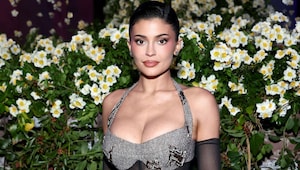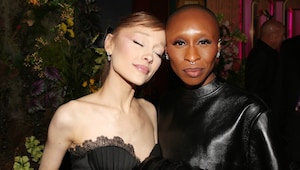Our Problematic Obsession With Celebrity Breakdowns
Are we confused about where 'entertainment' ends?

In 2007 Britney Spears was photographed storming into a hairdressers in Tarzana, Los Angeles, grabbing a set of clippers and shearing clumps of hair from her head until she was completely bald. A few days later, while being chased by photographers she attacked a paparazzo's car with an umbrella in a petrol station car park.
Within days, images from that night - of a fiery-eyed, bald-headed Britney brandishing a smashed up green umbrella - were plastered across front pages around the world. Mugs, t-shirts and the prolific meme, stating “If Britney can make it through 2007, we can make it through this day”, started to do the rounds internationally.
To this day, her traumatic breakdown is batted around the internet as “iconic”, the meme is still regularly posted to social media and imitations of the night she shaved her head while more than 70 photographers took pictures are regularly dredged up in the name of comedy.
In our relationship with the circus of celebrity, we are the abusive partner. We have a twisted cultural need to see people rise only so that we can laugh and point when they fall. Britney’s journey from saccharin pop sensation to troubled young mother lashing out in desperation perfectly sums up our fetish for a celebrity fall. What was a horrifying and unsettling incident wherein a young mother of two - tormented by mental illness - very publicly broke down, quickly became gossip, “iconic”, funny.
Likewise, in 2012 Amanda Bynes suffered a public mental breakdown that would see her accused of shoplifting, turning up to court in a dishevelled blonde wig and famously tweeting Drake asking him to “murder [her] vagina”. She was dropped by her agent, publicist and lawyer in the space of a few weeks, after they claimed she had been uncontactable for a whole month. Witness accounts of her erratic behaviour starting pouring around the internet; from the claim she walked around a tanning salon naked to the observers in a spin class who alleged she stripped down to her strapless bra and spent ten minutes touching up her make up before leaving the class. These accounts were as boundless as the jokes they provoked. Within days, the internet was awash with mocking memes and photo galleries of her at her worst.
“Clearly, both women were under huge amounts of pressure and broke their own personal threshold for what they could psychologically manage,” says Dr Elena Touroni, a Consultant Psychologist and co-founder of The Chelsea Psychology Clinic. “A breakdown is going to look different for everyone, depending on a person’s individual coping mechanisms. In both of these cases, anger was a way of expressing how overwhelmed they were feeling."
Does our fascination with a public downfall come from a place of inherent jealousy? Do we enjoy seeing the rich and famous suffer just to know that they can? So we can reassure ourselves they’re not as superhuman and godlike as they appear. Or maybe it’s just pure voyeurism, that car crash you can’t look away from.
Dr Touroni believes our sanctioned fascination with celebrities has a lot to answer for in these cases.“Because we idealise them in many ways, this voyeuristic fascination is an attempt to bring them down to a level of human vulnerability we can relate to.”
“It’s an unusual situation where we feel like we know a lot about these individuals, whereas, in reality, we don’t. Because of this, there’s no real connection and it’s much easier for us to construct our own narrative about them.”
The last decade of celebrity, and our consumption of it, has changed dramatically. Celebrities no longer have to rely on paparazzi and red top papers to tell the story of their lives, they have social media to dictate their image and express themselves. We have also entered into a time where mental health is more freely spoken about than ever. We are quick to check up on friends and because we’re fused to our phones we are getting much better at offering a steady support system to those who need it. We are so much more aware of the implications of erratic behaviour. We know what a warning sign looks like. Don’t we?
We all watched Amy, the intimate documentary into the life and death of Amy Winehouse. During the last years of her life, we, the public watched as drug and alcohol addiction, mental ill health and eating disorders consumed her. Images of her wandering the streets of London topless and barefoot circulated as parodies of her became as commonplace as the memes that said, “maybe I should have gone to rehab”; a twisted jibe at one of her most famous songs.
In isolation each one of these incidents garnered little recognition from most of us. She was just the celebrity version of propping your drunk friend up as you drag them home on a Saturday night: a mildly judgmental shake of the head, a snorty laugh and you move on with your life.
But when the documentary came around in 2015, four years after her death from alcohol poisoning, it felt like a seismic shift. Having her last few years drip fed to us over the course of an hour and a half seemed to change people’s understanding of the chronology of what had happened; it had been a process, rather than a collection of incidents. As a society we had watched it all from behind glass and simply laughed. The response to the film felt like an entire culture promising not to make this same mistake again.
We made the same promise after Amanda Bynes and Britney Spears, and after Justin Bieber, Whitney Houston and Mischa Barton. Since all their respective breakdowns we’ve learnt much more about the experience they went through, and most of them have told us - in black and white - that what we did was bad. We received our societal slap on the wrist. And yet, do we ever really learn? Have we ever kept this promise?
Take a look at Caroline Calloway, the influencer who gained notoriety in 2018 when her creativity workshops were called out on Twitter for allegedly being a scam. Earlier this year, her ex-best friend Natalie Beach penned an exposé for The Cut alleging (among other things) that she wrote the Instagram captions that had initially made Caroline famous. Natalie went for the jugular, claiming that Caroline was not only disingenuous, but also painted her as a bad friend, someone who takes advantage, someone who can’t be trusted. Two days after the expose landed, Caroline’s father was found dead in his home, in an apparent suicide. He had been there for a week, maybe more.
In a piece by Caitlin Flanagan for The Atlantic, Caroline’s close relationship with her father and her unrelenting need to gain his approval is explored. Having the world come after you online, torch and pitchfork in hand is a horrible, torturous and throttling sensation (as anyone who has ever been trolled will tell you), but for the girl who has just lost a parent in such troubling circumstances, this goes beyond pain.
In aspects of Caroline’s social media presence now; you can see the worrying signs we have become so accustomed to, you can see a young woman, hunted and hated, unravelling into someone desperately trying to claw back her name. As a society we have the opportunity to make up for our past mistakes; with Britney, Kanye, Bynes - ad infinitum. And yet, for Halloween this year many people dressed up as Caroline, wearing t-shirts saying “Scammer” and hashtagging their posts “Calloween”.
And it’s not just Caroline. What about 90s child star Aaron Carter? Who in September tweeted that his brother Nick, had filed a restraining order against him after Aaron told him he had thoughts about “killing babies… and [Nick’s wife] Lauren.” Aaron is reportedly increasingly unstable and suffers from schizophrenia along with multiple other mental illnesses. His family are said to be scared he would “only listen to the voices in his head”. He has since been hospitalised for exhaustion after his weight had plummeted to just 52kg. As I write this, just a few days after he was admitted to hospital, a quick search of his name on Twitter will bring up trolls, memes and even jokes about men in white coats “coming for [him]”.
Now think about Kanye West, who famously suffered a breakdown in 2016 and was hospitalised as a result, and is prone to struggle with episodes sparked by his bipolar disorder. When these episodes come around, they become as much cultural entertainment as the music he creates. So, is it that we don’t learn - or that we choose not to listen?
“There is an element of dehumanisation at play here,” says Joanna Konstantopoulou, a psychologist and founder of the Harley Street-based Health Psychology Clinic. “People with fame shift into a different realm for us culturally, and this causes us to believe that it's okay to treat them differently. We tend not to respect their privacy and often forget that they have feelings just like us. As a result, when celebrities are going through a crisis or a psychological meltdown, we often forget about what they are going through and instead see their situation as a source of gossip.”
If one of your friends, a member of your family or someone you worked with suffered a mental breakdown, would you dress up as them for halloween? Would you plaster memes mocking them at their lowest all over your social media accounts? We are growing more comfortable about discussing our mental health, in many ways the fight for its normalcy is making ground, but in the world of celebrity, having a public mental health crisis is still akin to throwing someone in the stocks and pelting them with rotten fruit. We seem to fictionalise famous people; ignoring the living, breathing, feeling person behind the crisis.
more from Celebrity

Vishal Jethwa on fear, family, and the fashion moment that helped him fight imposter syndrome

The Cosmo-approved holiday beauty list to help you glow through party season

Why 'Heated Rivalry' has everyone hot, bothered, and obsessed

Regal revivals, fashion shake-ups, and everything new we’re obsessing over this month

When is the new season of 'Euphoria' out? Plus 5 things we know about it

Why your best friend might be the most stable relationship you’ll ever have

The beauty drops currently living rent-free on our vanities

Everything you need to know about dark spots before you try to fade them

I’m a romance writer—my husband and I lived out the sex scene I was writing

Why more people are turning to audio erotica for more intimate fantasies
